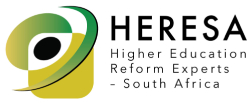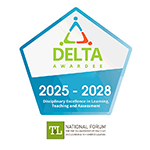The Best Way to Predict the Future is to Create it
Higher Education Reform Experts of South Africa (HERE-SA)
The HERESA project is an Erasmus+ Capacity Building Project for Higher Education (CBHE), which was awarded to the Technological Higher Education Network South Africa (THENSA) and OBREAL-Global Observatory in 2020. The three year project aims at developing a network of Higher Education Reform Experts in South Africa, inspired by the important practice of the Higher Education Reform Experts (HERE) in the EU region. HERE have been influencing policy change in their respective countries for approximately a decade.

HERE-SA, based in the member universities of THENSA (previously SATN), will form a similar network of South African technology-focused universities. This network will focus on the revision and reinvigoration of teaching and learning strategies, especially when it comes to Work-Integrated Learning (WIL), entrepreneurship and teaching for the Fourth Industrial Revolution (4IR).
The Hincks Centre are part of a strong MTU team that includes Extended Campus, Department of Mechanical Engineering and TEL (Technology Enhanced Learning Unit). Project partners are from South Africa, Spain, Italy, France, Finland and Sweden.
The project kicked-off virtually on February 25, 2021 and will run for 36 months.
Partner locations
The Technological Higher Education Network South Africa (THENSA), Pretoria, South Africa is the lead partner with 13 other partners from:
- Cape Peninsula University of Technology, Cape Town, South Africa;
- Central University of Technology, Bloemfontein, South Africa;
- Durban University of Technology, Durban, South Africa;
- Tshwane University of Technology, Pretoria, South Africa;
- University of Venda, Thohoyandou, South Africa;
- Walter Sisulu University, Mthatha, South Africa;
- South African Qualifications Authority (SAQA), Pretoria, South Africa;
- OBREAL Global, Barcelona, Spain;
- Munster Technological University (MTU), incorporating the Hincks Centre for Entrepreneurship Excellence, Extended Campus, Technology Enhanced Learning Unit (TEL), Department of Mechanical, Biomedical and Manufacturing Engineering, Cork, Ireland;
- Politecnico de Torino, Turin, Italy;
- UBFC (Burgundy and Franche-Comté), Besançon, France;
- Tampere University of Applied Sciences (TAMK), Tampere, Finland and
- Kungliga Tekniska Högeskolan (KTH), Stockholm, Sweden.




